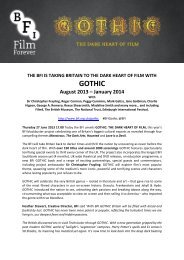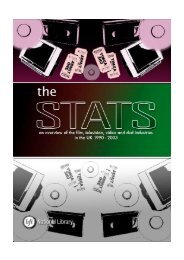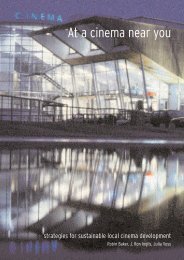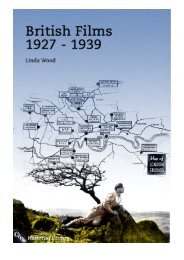Download (1.77 MB - PDF) - British Film Institute
Download (1.77 MB - PDF) - British Film Institute
Download (1.77 MB - PDF) - British Film Institute
Create successful ePaper yourself
Turn your PDF publications into a flip-book with our unique Google optimized e-Paper software.
<strong>British</strong> <strong>Film</strong>s 1971 - 1981<br />
WHAT IS A BRITISH FILM?<br />
CRITERIA WHICH CAN BE USED TO A S S E S S<br />
WHETHER A FILM IS BRITISH<br />
By examining the various factors which can be used<br />
to define what is a <strong>British</strong> film, it is possible to indicate<br />
the difficulties involved in arriving at a generally<br />
acceptable definition.<br />
SOURCE OF FINANCE<br />
In the past somewhere between 70% and 90% of the<br />
finance for films made in Britain has come from<br />
American sources. Although there has been a recent<br />
slight withdrawal of American money, it has been<br />
replaced by alternative but nevertheless still foreign<br />
investment. It is no longer always possible to attach<br />
a nationality to the source of finance. The trend is<br />
i n c re a s i n g ly towa rds international companies<br />
whose bases shift according to the financial incentives<br />
operating at any given time and which lack any<br />
distinct nationality. Moreover, there are <strong>British</strong> based<br />
companies such as EMI which over the past few<br />
years have financed a series of major productions in<br />
the USA e.g. ‘The Deer Hunter’ and ‘Honky Tonk<br />
Freeway’, and it would stretch both credibility and<br />
common sense if such films were described as<br />
<strong>British</strong>.<br />
WHERE THE PRODUCTION COMPANY IS<br />
REGISTERED<br />
The registration of a company as <strong>British</strong> does not<br />
guarantee that the films it produces will have any<br />
<strong>British</strong> bias. The legal requirements for setting up a<br />
c o m p a ny are easy to comply with and most<br />
American majors have established satellites here.<br />
While these deal with the day-to-day running of the<br />
company, general policy is decided and overall control<br />
exercised from outside Britain. Decisions tend<br />
to be made on the basis of how far they contribute to<br />
the interests of the parent company and how they fit<br />
into its general policy; the effects of these decisions<br />
on the development of a <strong>British</strong> cinema is a secondary<br />
consideration.<br />
WHERE THE FILM IS MADE<br />
Some films have been made in Britain solely<br />
because it was cheaper either through low direct<br />
costs, high subsidies or tax incentives to make them<br />
here; the cast and many of the key technical personnel<br />
have all been foreign and the films lack either<br />
<strong>British</strong> backgrounds or themes. ‘Reds’, ‘Dutchman’<br />
and ‘The Ritz’ are all examples of this.<br />
NATIONALITY OF THE CAST AND CREW<br />
It is very rare for a film to have a 100% <strong>British</strong> cast<br />
and crew. The problem arises of deciding at what<br />
percentage point of <strong>British</strong> staffing a film ceases to<br />
count as <strong>British</strong>.<br />
BFI Information Services<br />
11<br />
CONTENT<br />
Unlike the other factors examined which can be<br />
assessed against objectively quantifiable criteria, no<br />
hard and fast rules can be established for judging<br />
the presence of <strong>British</strong> content. It is, in fact,<br />
extremely difficult to pin down what exactly invests<br />
a film with a sense of <strong>British</strong>ness and definitions,<br />
when people are prepared to commit themselves,<br />
remain vague and open to interpretation.<br />
Rosamund John in the mid-fifties spoke of ‘films<br />
which present the <strong>British</strong>’ (New Theatre, September<br />
1948). Jean Paul Torok in an article in Positif (June<br />
1971, translated in Monogram. No.3, 1972) referred to<br />
‘films which have a definite sense of origin’. John<br />
Russell Taylor in an article in Sight and Sound (vol.43<br />
no.2 Spring 1974) referred to films ‘which reflect the<br />
<strong>British</strong> scene and seem vitally connected with observation<br />
of the <strong>British</strong> way of life’. <strong>British</strong> films have<br />
been criticised for failinq to identify with or look at<br />
<strong>British</strong> society as a whole, of dealing with and being<br />
made from the standpoint of a small minority, that<br />
of middle class England. A further criticism made is<br />
that the potential of films which do present realistic<br />
backgrounds and working class characters is often<br />
dissipated by their makers using this as a substitute<br />
rather than a starting point for any moral/psychological<br />
conflict, social commitment or any meaningful<br />
examination of society.<br />
Official organisations with their dislike of subjectivity<br />
and anything possibly controversial have tended<br />
to avoid any reference to content in their definition<br />
of what is a <strong>British</strong> film.<br />
Given the problem of arriving at a totally satisfactory<br />
definition of ‘<strong>British</strong>’ and the difficulties involved<br />
in checking any new set of criteria, it was decided to<br />
base the first part of the catalogue on the<br />
Department of Trade’s registration system. However,<br />
there is also a list of films made wholly or in part by<br />
<strong>British</strong> registered companies which did not qualify<br />
for <strong>British</strong> registration.<br />
There are three main advantages to be gained from<br />
using the Department’s register:<br />
Its comprehensiveness - there exists a statutory<br />
obligation to register all films theatrically shown.<br />
The flexible nature of the definition (see below).<br />
Its thoroughness - the <strong>Film</strong> Branch vigorously scrutinises<br />
any film submitted for <strong>British</strong> registration.









